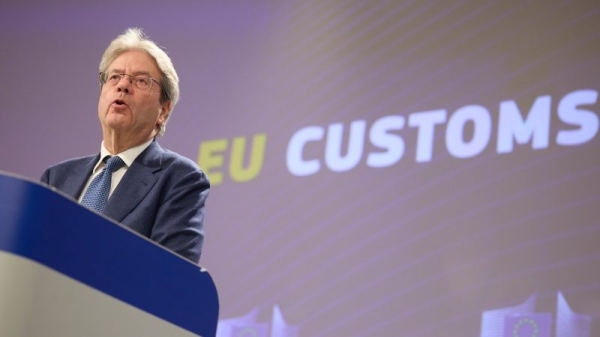EU Commission presents ‘most ambitious customs reform since 1968’

The European Commission proposed on Wednesday (17 May) an overhaul of the EU’s Customs Union, suggesting a common EU Customs Data Hub as well as a new EU Customs Authority.
The proposal comes at a time when trade flows are increasing, especially in e-commerce, and an increasing amount of EU legislation requires closer scrutiny of supply chains.
“It is, I would say, the most ambitious and comprehensive reform that we are proposing since the start of the Customs Union, which was in 1968,” Economy Commissioner Paolo Gentiloni said as he presented the reform proposal.
EU Customs Data Hub
A central part of the proposal is a new EU Customs Data Hub, which should allow importers to do their customs declaration in a single online environment, thus reducing the administrative burden for companies.
Additionally, businesses where “processes and supply chains are completely transparent”, which the Commission calls the most trusted traders, would be able to put their goods into circulation without any active customs intervention at all.
The implementation is still some time away, however. The data hub should open for e-commerce in 2028, followed by other importers in 2032 on a voluntary basis, according to the Commission proposal. Starting in 2038, the hub would become mandatory for all importers.
Moreover, the data hub should make the sharing of data much easier for national customs authorities that currently all use different IT systems.
“The data hub will eventually replace 111 national IT systems that are now in place,” Gentiloni said, arguing that this would save member states “up to €2 billion a year in operational costs”.
The Commission also hopes that the pooled data would allow the EU to better analyse trade flows and predict problems.
EU Customs Authority
This is where a new EU Customs Authority that the Commission wants to set up should come in, helping member states to “prioritise the right risks and coordinate their checks and inspections – especially during times of crisis”.
Most recently, the EU and its member states have come under criticism for not being able to put an end to the circumvention of international sanctions against Russia.
Moreover, the EU has started implementing new rules that need stricter control of supply chains, for example, the regulation on deforestation-free products and the carbon border adjustment mechanism.
More EU rules in this direction are currently being debated by the European Parliament and member states, for example, the forced labour product ban and the due diligence law.
“Currently, the member states assess and manage risks of non-compliance with EU rules through national systems and data,” Gentiloni said, arguing that the reform would change that.
Increased pressure from e-commerce
However, the reform would not replace the national customs authorities.
“The customs is an EU competence, but it is nationally organised, the commissioner said, adding that the EU was “not building the Frontex of customs”, referring to the joint EU border agency.
The government of the Netherlands, where a third of all imports to the EU pass through, welcomed the proposal in principle, according to a statement by Aukje de Vries, the Dutch state secretary for benefits and customs.
However, she also saw room for improvement.
“Both large and small companies should be able to benefit from the proposed simplifications; this should not be restricted to large multinationals only,” she said.
“Finally, the Netherlands will critically assess whether the proposals will be sufficient to make the enormous volumes of e-commerce declarations manageable for customs authorities.”.
According to the Commission, one billion customs declarations per year come from e-commerce alone.
The Commission proposal will next be discussed by national governments as well as the European Parliament, who will need to reach a common position for the proposal to go forward.
Read more with EURACTIV




